一般过去时的用法详解
一般过去时 用法
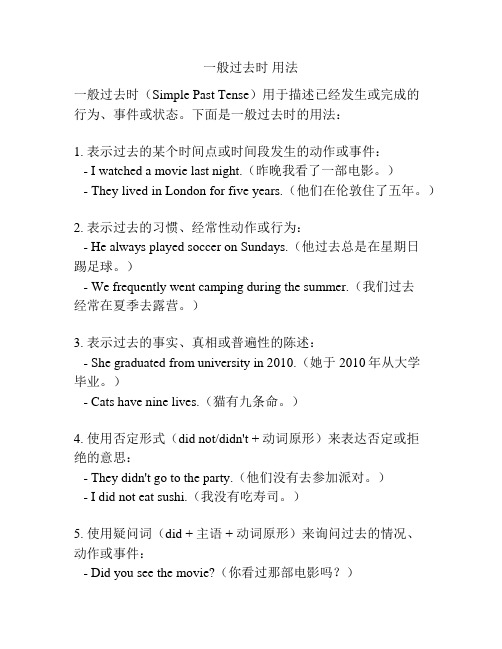
一般过去时用法一般过去时(Simple Past Tense)用于描述已经发生或完成的行为、事件或状态。
下面是一般过去时的用法:1. 表示过去的某个时间点或时间段发生的动作或事件:- I watched a movie last night.(昨晚我看了一部电影。
)- They lived in London for five years.(他们在伦敦住了五年。
)2. 表示过去的习惯、经常性动作或行为:- He always played soccer on Sundays.(他过去总是在星期日踢足球。
)- We frequently went camping during the summer.(我们过去经常在夏季去露营。
)3. 表示过去的事实、真相或普遍性的陈述:- She graduated from university in 2010.(她于2010年从大学毕业。
)- Cats have nine lives.(猫有九条命。
)4. 使用否定形式(did not/didn't + 动词原形)来表达否定或拒绝的意思:- They didn't go to the party.(他们没有去参加派对。
)- I did not eat sushi.(我没有吃寿司。
)5. 使用疑问词(did + 主语 + 动词原形)来询问过去的情况、动作或事件:- Did you see the movie?(你看过那部电影吗?)- Did he go to the concert with you?(他和你一起去听音乐会了吗?)需要注意的是,一般过去时的动词变化规则为动词原形后加上-ed或-d,但也有一些特殊动词的变化形式需要记忆(如go变为went)。
一般过去时的语法
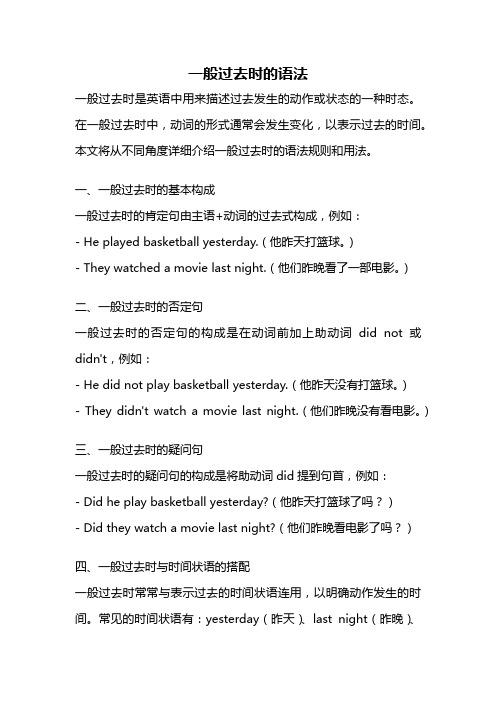
一般过去时的语法一般过去时是英语中用来描述过去发生的动作或状态的一种时态。
在一般过去时中,动词的形式通常会发生变化,以表示过去的时间。
本文将从不同角度详细介绍一般过去时的语法规则和用法。
一、一般过去时的基本构成一般过去时的肯定句由主语+动词的过去式构成,例如:- He played basketball yesterday.(他昨天打篮球。
)- They watched a movie last night.(他们昨晚看了一部电影。
)二、一般过去时的否定句一般过去时的否定句的构成是在动词前加上助动词did not或didn't,例如:- He did not play basketball yesterday.(他昨天没有打篮球。
)- They didn't watch a movie last night.(他们昨晚没有看电影。
)三、一般过去时的疑问句一般过去时的疑问句的构成是将助动词did提到句首,例如:- Did he play basketball yesterday?(他昨天打篮球了吗?)- Did they watch a movie last night?(他们昨晚看电影了吗?)四、一般过去时与时间状语的搭配一般过去时常常与表示过去的时间状语连用,以明确动作发生的时间。
常见的时间状语有:yesterday(昨天)、last night(昨晚)、last week(上周)、in 2010(在2010年)等等。
五、一般过去时的用法1. 表示过去发生的动作或状态She lived in New York for five years.(她在纽约住了五年。
)2. 表示过去经常或反复发生的动作He often went swimming when he was young.(他年轻时经常去游泳。
)3. 表示过去的习惯或常态She always cooked dinner for her family.(她过去总是为家人做晚饭。
一般过去时和过去进行时的用法详解

一般过去时和过去进行时的用法详解一、一般过去时的用法一般过去时用于表示在过去某个特定时间或某个过去的时间段发生的动作或存在的状态。
以下是一般过去时的具体用法和相关示例:1. 表示过去的经常性动作或状态:- He played football every Saturday.(他每个星期六踢足球。
)- She always wore a red dress to parties.(她去派对时总是穿红色连衣裙。
)2. 表示过去的完成动作:- I finished my homework last night.(我昨晚完成了作业。
)- They visited their grandparents during the summer vacation.(他们在暑假期间拜访了他们的祖父母。
)3. 表示过去的习惯或特定时间段内的活动:- When he was young, he used to swim in the river every morning.(他年轻时,他习惯每天早上在河里游泳。
)- We lived in London for five years.(我们在伦敦住了五年。
)4. 表示过去的时间状语:- She traveled to Paris last summer.(上个夏天她去了巴黎。
)- He studied French when he was in college.(他上大学时学过法语。
)二、过去进行时的用法过去进行时用于表示过去某个时间点或某个时间段内正在进行的动作。
以下是过去进行时的具体用法和相关示例:1. 表示过去某一时刻正在进行的动作:- They were having dinner at 7 pm yesterday.(昨天晚上7点他们正在吃晚饭。
)- I was watching TV when the phone rang.(电话响的时候我正在看电视。
)2. 表示过去某个时间段内正在进行的动作:- She was studying all day yesterday.(昨天她一整天都在学习。
一般过去时的用法

般过去时的用法一般过去时表示过去某个时间发生的动作或存在的状态,也表示过去经常或反复发生的动作。
谓语动词要用动词的过去式,常和表示过去的时间状语连用,女口:yesterday 昨天,last night 昨晚,last week 上周,last year 去年等。
一.一般过去时的结构(可分两类不同的结构)1. Be 动词的一般过去时在没有实义动词的句子中使用be 动词,am/is 的过去式为was ;are 的过去式were。
肯定句式:主语+be (was/were) + 其他.否定句式:主语+be (was/were) +not + 其他. 一般疑问句:Be (was/ were) + 主语+其他。
2. 实义动词的一般过去时态肯定句要使用动词的过去式,否定句和疑问句要使用助动词do/does 的过去式did.肯定句式:主语+动词(过去式)+ 其他。
否定句式:主语+ didn 't +动词(原形)+其他(did not= didn 't)一般疑问句:Did +主语+动词(原形)+ 其他(do, does 的过去式均为did)? 注: 1.did 和didn 't 是构成一般过去时的助动词,其特点是要在其后跟动词的原形。
2. 实义动词do 的一般过去时,例:Jim went home yesterday. --- Jim didn ' t go home yesterday.(否定句)--- Did Jim go home yesterday?(一般疑问句)--- What did Jim do yesterday?(特殊疑问句)二.一般过去时的判断标志词:yesterday,the day before yesterday,last+ 时间,this morning, 时间+ago,just now,a moment ago,in+ 过去的时间注意:一般过去时表示过去经常或反复发生的动作,常和often 经常,always ,总是,once a week 一周一次,等表示频度的时间状语连用动词过去式变化规则:1. 一般在动词末尾加ed, 如:pull--pulled, cook--cooked, play--played2. 结尾是e 力口d,女口: taste--tasted, live--lived, use--used3. 末尾是辅音字母加一个元音字母的重读闭音节,应双写末尾的辅音字母,再力口ed,女口:stop-stopped, plan--planned4. 以“辅音字母+y ”结尾的,变y为i,再加ed,如:study-studied5. 不规则动词过去式:(见课后)过去时练习选择( ) 1.What __________ they ____________ dinner yesterday?D.wanted; buyA.do; have forB.did; had for;C. LeavedD.was leaving( )2.Could you tell me what time _______________ t he plane?A.leftB.leavesC.leavedD.left( )3.One of us ______________ band last month.A. leavesB. leaveC.leavedD. left( )4.Where _______________ your mother born?A.areB. wasC.wereD.is ( )5.Do you know why he _______________ for class last year?A.was always lateB.always was lateC.is late alwaysD.is always late( )6.I got up _______________ this morning. So I ________ breakfast and went to school.te, didn 't haveB. Early, didn 't havete, hadn ' tD.early, hadn 't( )7.It ______________ much cold today than it ___________ yesterday.A.is, isB.was, wasC.is, wasD.was, is ( )8.He didn ' t come __________ goodbye to us and ________ away.A.say,goB.say, wentC.to say, wentD.to say, go( )9.Her pen was broken.She ________ to _______ a new one.A.wants, buysB.wanted, boughtC.wants,bought ( )10.I thought the dress ________ really pretty.A.isB. wasC./D.were( )11.I ______________ tired now, but it __________ an exciting day.A.am, wasB.was,wasC.was,isD.am,is( )12.He said he ____________ go to cook dinner for us.A.willB.wouldC./D.doesn ' t( )13.I stayed in the sitting room and _________ my friends all the time.A.talk toB.talkedC.talk aboutD.talked to( )14.She also __________ her _____ in a 1990s style.A.weared;hairB.wore;hairC.wear;hairD.wears;hairs( )15.I went to see you last Saturday, ________ t here _____ nobody inthe room.A. but;wasB.and;wereC.and;wasD.but;is二、用所给词的适当形式填空1. He put the books away and ________ (go)home.2. The boy is running and ________ (tie)his shoes on the playground.3. My father ________ (buy) a new computer for _________ (I)yesterday.4. He often ___________ (go)to school by bike,but last year heoften ___ (walk)to school.5. After she finished _________ (pack )everything,she ______________ (go)to school.6. ----Who ____ (wash)the plates on the table?----Jenny did.7. ----When ___ you _____ (see)the film “ Titanic ” ?8. It' s half past eleven now.Jim ____ (have)lunch.He usually ____ (have)itat this time.9. She _______ (write)to Jill last month.She __________ (write) to him nexttime.10. The students _____ (stop)talking when their teacher came up.三、句型转换1. The children had a good time in the park.否定句:____________________________________________________一般疑问句:________________________________________________________对划线部分提问:________________________________________________________ 2. There were about nine hundred people at the concert.( _____ 音乐会)对划线部分提问:________________________________________________________ 一般疑问句:________________________________________________________否定句:____________________________________________________3. There was only one problem.否定句:____________________________________________________一般疑问句:________________________________________________________肯定/否定回答:_________________________________________________________ 4. A nn did her homework yesterday eve ning.否定句:____________________________________________________一般疑问句:________________________________________________________对划线部分提问:________________________________________________________ 5. Last week I read an English book.否定句:____________________________________________________一般疑问句:________________________________________________________肯定/否定回答:_________________________________________________________ 对划线部分提问:________________________________________________________2. Frank read an interesting book about history._________ Frank ___________ an in terest ing book about history?3. He' s cleaning his rooms.____________ he ________________ ?4. Why not go out for a walk?__________ _________ __________ ___________ out for a walk? 5. Thomas spent RMB 10 on this book.Thomas __________ __________ RMB 10 on this book.6. My family went to the beach last week.___________ ___________ ___________ family ________ last week?7.I didn ' t have any friends.___________ __________ have ___________ friends?8.I think she is Lily 's sister.9. Sally often does some reading in the morning.Sally _________ often _________ some reading in the morning.10.He is a tall boy._________ _________ he __________ __________ ?六.翻译下列句子1.我过了一个忙碌却又刺激的周末。
(完整版)一般过去时的概念及用法

一般过去时的概念及用法一、基本概念一般过去时(simple past tense)表示过去某个时间里发生的非持续性动作或存在的状态,也表示经常或反复发生的动作。
用动词的过去式表示,常和表示过去的时间状语连用,如:yesterday,last night,in 1990,two days ago,before,the age of等。
一般过去时也表示过去经常或反复发生的动作,常和often,always等表示频率的时间状语连用。
表示过去习惯性、经常性的动作、行为;过去主语所具备的能力和性格。
二、动词变化1.直接加ed: work—- worked look——looked2.以不发音e结尾的单词,直接加d: live ——lived hope-—hoped use——used3.以辅音字母+y结尾的,变y为i加ed: study——studied carry—-carried worry--worried 4.以一个辅音字母结尾的,双写最后的辅音字母+ed: stop—— stopped plan-—planned重读闭音节体现形式为辅-元-辅结构,例如nod, n为辅音,o为元音,d为辅音。
5。
以ic结尾的动词,要把ic变成ick再加ed,如picnic→picnicked,traffic→traffic ked 6.不规则变化的动词过去式:have---had are-—-were get-—-got say--—said feel——-felt do/does———did is---was go—--went drink——drank eat—-ate bring-———brought think-—--thought buy----bought catch--—- caught teach ---—taught sit-———sat wear—--—wore cut———-cut sweep----swept sleep-—slept see--——saw become-—-—became read-—read7.以辅元辅结尾的加d三、用法(1)一般过去时表示在过去某个特定时间发生,也可以表示过去习惯性、经常性的动作.一般不强调动作的影响,只说明的事情。
一般过去时用法讲解

一般过去时用法讲解1、概述一般过去时表示过去某个时间发生的动作或状态,常和表示过去的时间连用,yesterday, last night, in 1990, two days ago等。
也表示过去经常或反复发生的动作,常和often, always等表示频度的时间状语连用。
I got up at 6:30 yesterday.我昨天6:30起床。
He always went to work by bus last year.去年他总是坐公交车上班。
2、一般过去时的构成一般过去时由规则动词(-ed/-d)或不规则动词的过去时表示,除be外,其余动词没有人称和数的变化。
各种动词的否定结构和一般疑问结构,及一般现在时的否定结构和疑问结构相同。
3.Be动词在一般过去时中的变化:⑴am 和is在一般过去时中变为was。
(was not=wasn’t)⑵are在一般过去时中变为were。
(were not=weren’t)⑶带有was或were的句子,其否定、疑问的变化和is, am, are一样,即否定句在was或were后加not,一般疑问句把was或were调到句首。
4.句中没有be动词的一般过去时的句子否定句:didn’t +动词原形,如:Jim didn’t go home yesterday.一般疑问句:在句首加did,句子中的动词过去式变回原形。
如:Did Jim go home yesterday?特殊疑问句:⑴疑问词+did+主语+动词原形?如: What did Jim do yesterday?⑵疑问词当主语时:疑问词+动词过去式?如:Who went to home yesterday?5.规则动词过去式变化规则⑴.一般在动词末尾加-ed,如:play-played, cook-cooked⑵.结尾是e加d,如:like-liked love-loved⑶.末尾只有一个元音字母和一个辅音字母的重读闭音节,应双写末尾的辅音字母,再加-ed,如:stop-stopped⑷.以“辅音字母+y”结尾的,变y为i,再加-ed,如:study-studied6.-ed的发音规则:⑴.在清辅音后面,-ed读作/t/,如:kissed/kist/ talked/t:kt/ washed/wʃt/⑵.在元音或浊辅音后面,-ed读作/d/,如:played/pleid/ robbed/r bd/ rained/reind/⑶.在以字母t或d结尾的动词后面,-ed读作/id/,如:wanted/'w ntid/ added/'ædid/ planted/'pl a:ntid/6、一般过去时的用法(1)表示过去某个特定时间发生的动作或存在的状态常有明确的时间状语,如yesterday,last night, some years ago,in1890等,以及由when等引导的时间状语从句。
一般过去时的用法和表示方式

一般过去时的用法和表示方式一般过去时是英语中最常用的过去时态,用来表示已经发生或完成的动作、事件或状态。
本文将详细介绍一般过去时的用法和表示方式。
I. 一般过去时的定义一般过去时用于描述过去某个特定时间发生的动作或状态。
它与现在无关,强调的是过去的事实或经历。
II. 一般过去时的构成一般过去时的肯定句句式为:主语 + 动词过去式 + 其他成分。
例如:1. I went to the store yesterday.2. She played soccer with her friends last weekend.3. They studied English for three hours yesterday.否定句句式为:主语 + did not/didn't + 动词原形 + 其他成分。
例如:1. I didn't go to the store yesterday.2. She didn't play soccer with her friends last weekend.3. They didn't study English for three hours yesterday.疑问句句式为:Did + 主语 + 动词原形 + 其他成分?例如:1. Did you go to the store yesterday?2. Did she play soccer with her friends last weekend?3. Did they study English for three hours yesterday?III. 一般过去时的表示方式1. 定时或时间状语词一般过去时中常常与表示过去时间的词语或短语一起使用,如yesterday(昨天)、last night(昨晚)、in 1999(在1999年)等。
这些时间状语词能够帮助准确表达动作或事件发生的具体时间。
一般过去时用法描述

一般过去时用法描述一般过去时是英语语法中的一种时态,用于描述发生在过去的动作、事件或状态。
在构成上,一般过去时的动词形式为动词的过去式,通常是动词原形加上-ed结尾,或者根据动词的变化规则来变化。
一般过去时除了描述过去的动作之外,还可以用于表达过去的习惯、习惯性行为或者过去的真实情况。
在进行详细描述时,可以从一般过去时的构成、用法及常见错误等方面进行阐述。
接下来,我们将着重介绍一般过去时的用法,以及一些注意事项。
一、一般过去时的用法:1. 表示过去的动作或事件:一般过去时常用来描述过去发生的动作或事件,例如:- She visited her grandparents last summer.(她去年夏天拜访了她的祖父母。
)- They went to the park yesterday.(他们昨天去了公园。
)2. 表示过去的习惯或习惯性行为:一般过去时也可以用来描述过去的习惯或经常发生的行为,例如:- When I was a child, I played with my friends every day.(我小的时候,每天都和朋友们一起玩。
)- He always helped his mother with the housework.(他总是帮他妈妈做家务。
)3. 表示过去的真实情况:一般过去时还可以用来表示过去的真实情况,例如:- I thought he was a nice person.(我当时以为他是一个好人。
)- The sky was clear and the sun was shining.(天空晴朗,阳光灿烂。
)二、一般过去时的构成:一般过去时的构成主要取决于动词的不规则变化规则和规则变化规则。
不规则动词的过去式形式需要单独记忆,而规则动词的过去式则通常是在动词后面加上了-ed结尾。
以下是一般过去时的构成规则的主要内容:1. 一般动词(regular verbs):- 动词原形+ed结尾,例如:walked, talked, played等。
一般过去时的用法

一般过去时一、一般过去时的基本用法一般过去时表示过去某一时候或某一段时间所发生了的事情或存在的状态,常与过去时间状语连用。
二、一般过去时的时间状语①与yesterday连用的时间,例如,yesterday,yesterday evening,the day before yesterday,等②与last连用的时间,即last+时间,例如last night, last week③与ago连用的时间,即时间+ago,例如 a moment ago.three days ago④in+过去时间,例如in 1998, in 2000⑤表示过去的时间just now,this morning, once upon a time,the other day,at the age of+过去的年龄,at that time, at that moment等三、一般过去时的结构1、肯定形式:① be动词:主语+was/were+其他eg:i was very busy yesterday.②行为动词:主语+动词过去式+其他eg:i played football yesterday.2、否定形式:①主语+was/were+not+其他eg:i was not busy yesterday.②主语+didn’t+动词原形+其他eg:i didn’t play football yesterday.3、一般疑问句:① was/were+主语+其他?eg: were you busy yesterday?② Did +主语+动词原形+其他? eg: did you play football yesterday?4、特殊疑问句:特殊疑问词+一般疑问句四、动词过去时动词变化规则。
一般过去式的结构,用法,含义及标志性时间状语

一般过去式的结构,用法,含义及标志性时间状语【精选】一、一般过去时的基本结构:1、肯定句“主语+动词过去式+其他”或者“主语+was/were +其他”。
【举例】 I played tennis last weekend. 我上周末打网球了。
My school trip was great. 我的学校郊游棒极了。
2、否定句“主语+didn’t+动词原形+其他”或“主语+wasn’t/weren’t+其他”。
【举例】 The girl didn’t play computer games yesterday afternoon.这个女孩昨天下午没玩电子游戏。
Old Henry wasn’t happy last Friday. 上星期五老亨利不高兴。
3、一般疑问句“Did+主语+动词原形+其他?”肯定回答为“Yes,主语+did”。
否定回答为“No,主语+didn’t”或者“Was/Were+主语+其他?”肯定回答为“Yes,主语+was/were”。
否定回答为“No,主语+wasn’t/weren’t”。
【举例】— Did you go to the beach? 你们去海滩了吗?— Yes, we did./No, we didn’t. 是的,我们去了。
/不,我们没有。
— Was your weekend OK? 你的周末过得还行吧?— Yes, it was./No, it wasn’t. 是的,还行。
/不,不行。
4、特殊疑问句:特殊疑问词+一般疑问句(顺序)?【举例】— What did Li Lei do last weekend? 李雷上周末干什么了?— He visited his grandparents. 他去看了他的祖父母。
— Where were you yesterday? 你昨天在哪儿?— I was at home. 我在家里。
二、一般过去时的基本用法:一般过去时表示过去某个时间发生的动作或存在的状态,也可表示过去经常或反复发生的动作。
一般过去时用法说明

一般过去时用法说明1. 一般过去时表过去(1) 表示过去发生的动作或存在的状态:He bought the computer five years ago. 这电脑是他五年前买的。
It was then a small fishing village.那时它只是一个小渔村。
(2) 表示过去经常性或习惯性的动作:We often played together when we were children.我们小时候常在一起玩。
【注】表过去习惯性的动词,也可用used to或would:He used to go to work by bus. 他过去常乘公共汽车去上班。
2. 一般过去时表现在(1) 在宾语从句中,由于时态呼应的关系,可用一般过去时表示现在:I didn’t know you were here. 我不知道你在这儿。
(were实际上指现在)I didn’t know you were so busy.我没想到你这么忙。
(were实际上指现在)(2) 表示客气委婉的现在:I wondered if you were free this evening. 不知您今晚是否有空。
I thought you might like some flowers. 我想您也许想要些花。
【注】能这样有的动词主要限于want, wonder, think, hope, intend等少数动词。
(3) 用于某些特殊结构中表示现在It’s time we started. 我们该动身了。
I wish I knew his name. 要是我知道他的名字就好了。
I’d rather you lived closer to us. 我希望你能住得离我们近点。
【注】该用法主要用于it’s time, I wish, I’d rather, if only, as if, as though 等少数结构后接从句的情形,其中有些结构后面的句子还可用一般过去时表示将来:I’d rather you came next Monday. 我宁愿你下周星期一来。
一般过去时的讲解用法
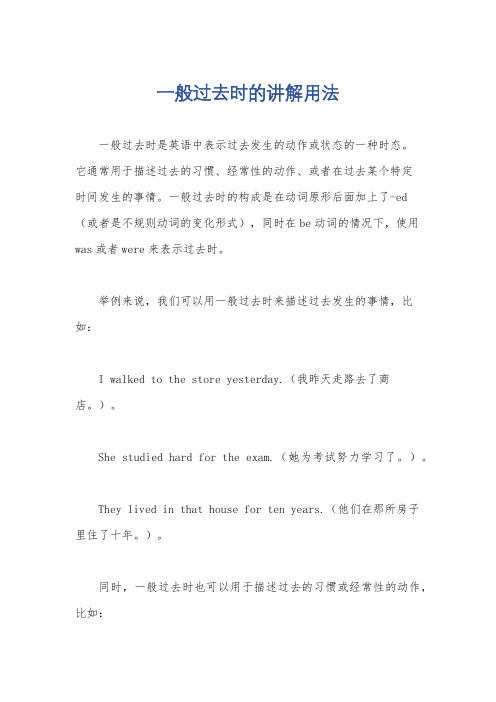
一般过去时的讲解用法
一般过去时是英语中表示过去发生的动作或状态的一种时态。
它通常用于描述过去的习惯、经常性的动作、或者在过去某个特定
时间发生的事情。
一般过去时的构成是在动词原形后面加上了-ed
(或者是不规则动词的变化形式),同时在be动词的情况下,使用was或者were来表示过去时。
举例来说,我们可以用一般过去时来描述过去发生的事情,比如:
I walked to the store yesterday.(我昨天走路去了商店。
)。
She studied hard for the exam.(她为考试努力学习了。
)。
They lived in that house for ten years.(他们在那所房子
里住了十年。
)。
同时,一般过去时也可以用于描述过去的习惯或经常性的动作,比如:
She always played the piano after dinner.(她过去总是在晚饭后弹钢琴。
)。
He never ate vegetables when he was a child.(他小时候从不吃蔬菜。
)。
需要注意的是,一般过去时有时候也可以用于表示虚拟语气,比如在if条件句中,表示与现在事实相反的情况:
If I had known, I would have helped.(如果我当时知道的话,我本来会帮忙的。
)。
总的来说,一般过去时是用来描述过去发生的事情、习惯或经常性动作的时态,它是英语中非常基础和常用的时态之一。
希望这样的解释能够帮助你理解一般过去时的用法。
一般过去时的用法归纳
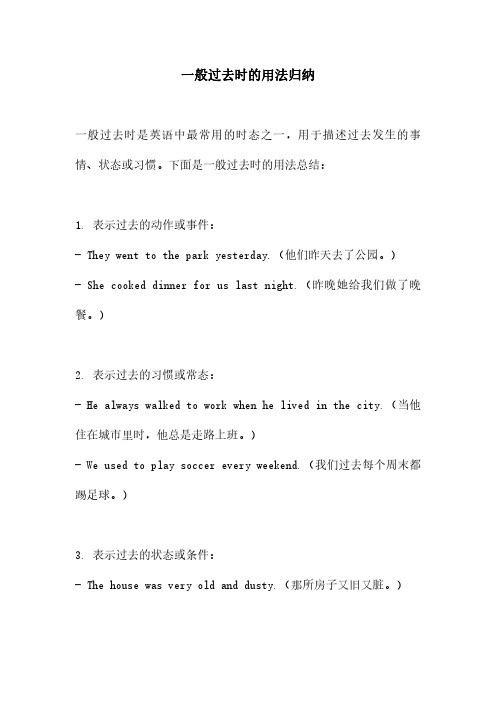
一般过去时的用法归纳一般过去时是英语中最常用的时态之一,用于描述过去发生的事情、状态或习惯。
下面是一般过去时的用法总结:1.表示过去的动作或事件:-They went to the park yesterday.(他们昨天去了公园。
)-She cooked dinner for us last night.(昨晚她给我们做了晚餐。
)2.表示过去的习惯或常态:-He always walked to work when he lived in the city.(当他住在城市里时,他总是走路上班。
)-We used to play soccer every weekend.(我们过去每个周末都踢足球。
)3.表示过去的状态或条件:-The house was very old and dusty.(那所房子又旧又脏。
)-I was tired after a long day at work.(工作一整天后,我感到很累。
)4.与时间状语连用:-He studied English for two hours yesterday.(他昨天学习了两个小时的英语。
)-She visited her grandparents last summer.(去年夏天她拜访了她的祖父母。
)需要注意的是,在一般过去时中,动词的变化规则如下:-对于大多数动词,过去式是在动词原形后加上-ed,例如:talked, walked,played。
-以不发音的-e结尾的动词,只需加上-d,例如:lived,loved。
-以重读闭音节结尾,并且末尾只有一个辅音字母的动词,需双写末尾的辅音字母,并加上-ed,例如:stopped,planned。
综上所述,一般过去时是用来描述过去发生的动作、状态或习惯的时态。
在使用一般过去时时,我们需要注意动词的过去式变化规则,并与适当的时间状语连用,以使表达更加准确和清晰。
一般过去时的用法及常见句型总结
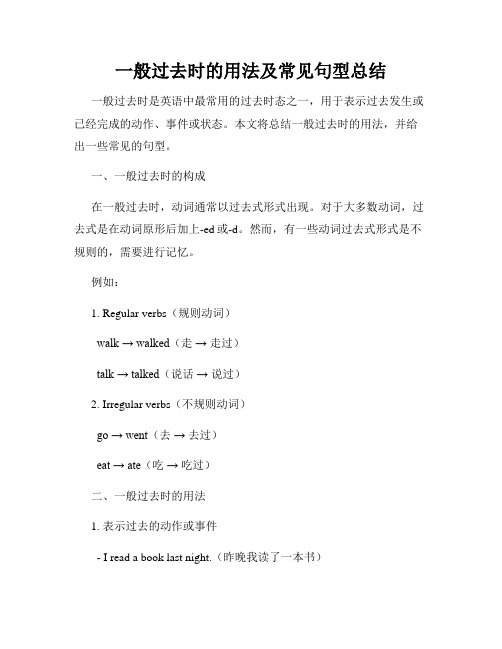
一般过去时的用法及常见句型总结一般过去时是英语中最常用的过去时态之一,用于表示过去发生或已经完成的动作、事件或状态。
本文将总结一般过去时的用法,并给出一些常见的句型。
一、一般过去时的构成在一般过去时,动词通常以过去式形式出现。
对于大多数动词,过去式是在动词原形后加上-ed或-d。
然而,有一些动词过去式形式是不规则的,需要进行记忆。
例如:1. Regular verbs(规则动词)walk → walked(走→ 走过)talk → talked(说话→ 说过)2. Irregular verbs(不规则动词)go → went(去→ 去过)eat → ate(吃→ 吃过)二、一般过去时的用法1. 表示过去的动作或事件- I read a book last night.(昨晚我读了一本书)- They went to the cinema yesterday.(他们昨天去了电影院)- She cooked dinner for her family.(她为家人做饭)2. 表示过去的习惯或常态- We always played basketball after school.(我们放学后经常打篮球) - He used to live in Paris.(他过去住在巴黎)- She would often visit her grandparents.(她经常去看望她的祖父母)3. 用于时间状语从句一般过去时可以与一些表示过去的时间状语连用,如yesterday(昨天)、last week(上周)、in 2005(在2005年)等。
- I saw him yesterday.(我昨天见到了他)- She called me last night.(她昨晚给我打电话了)- They visited the museum in 2005.(他们在2005年参观了博物馆)4. 否定句和疑问句的构成在一般过去时的否定句和疑问句中,需要使用助动词did,并且动词恢复成原形。
一般过去时用法及概念

一般过去时的用法及概念在英语语法中,一般过去时是一个重要的时间表达方式。
它主要用于描述过去发生的事情,或者在过去某个特定时间点完成的动作。
理解和掌握一般过去时的用法和概念对于提高英语水平具有重要意义。
一、一般过去时的概念一般过去时是一种动词时态,表示在过去某个时间或时间段内发生的动作或存在的状态。
这个时态的主要标志是动词的一般过去式形式,即动词原形后面加-ed。
二、一般过去时的用法1. 描述过去的事实或情况:例如,“Yesterday, I went to the park.”(昨天,我去了公园。
)2. 表示过去习惯性的动作:例如,“When I was a child, I always played football with my friends after school.”(当我还是个孩子的时候,放学后我总是和朋友们一起踢足球。
)3. 用于叙述故事或讲述过去的历史事件:例如,“In 1969, Neil Armstrong walked on the moon for the first time in human history.”(1969年,尼尔·阿姆斯特朗首次在人类历史上在月球上行走。
)三、一般过去时的构成一般过去时通常由主语+动词的一般过去式+宾语组成。
动词的一般过去式是在动词原形的基础上加上-ed。
但需要注意的是,有些不规则动词的过去式形式需要特殊记忆,例如go的过去式是went,eat的过去式是ate等。
四、一般过去时的否定句和疑问句在一般过去时的否定句中,我们使用助动词did not(didn't)+动词原形。
例如,“I didn't eat breakfast this morning.”(今天早上我没有吃早餐。
)在一般过去时的疑问句中,我们同样使用助动词did,将did提到主语之前。
例如,“Did you go to the party last night?”(你昨晚去参加聚会了吗?)。
一般过去时详解(重点)

一般过去时详解(重点)一般过去时是表示过去发生的事情,因此常用的时间状语有yesterday。
last night。
last week。
last year等。
在句子中,肯定句要用动词的过去式,否定句和疑问句则要使用助动词did和didn’t。
一、一般过去时的概念:一般过去时用于描述过去某一时间内发生的动作或存在的状态,以及过去惯性、反复性的动作。
常与表示过去的时间状语连用,如yesterday、last night、last week、last year等。
二、一般过去时的结构:(可分三类不同的结构)1.Be动词的一般过去时在没有实义动词的句子中使用be动词,am和is的过去式为was,而are的过去式为were。
在句子中,肯定句式为主语+be(was。
were)+其它,否定句式为主语+be(was。
were)+not+其它,一般疑问句式为Be(was。
were)+主语+其它。
需要注意的是,be动词有人称和数的变化,即要根据主语选用was/were。
2.实义动词的一般过去时态在实义动词的肯定句中,要使用动词的过去式;而在否定句和疑问句中,则要使用助动词do和does的过去式did。
具体来说,肯定句式为主语+动词(过去式)+其它,否定句式为主语+didn’t+动词(原形)+其它(did not=didn’t),一般疑问句式为Did+主语+动词(原形)+其它(do、does的过去时均为did)。
需要注意的是,did和didn’t是构成一般过去时的助动词,其后要跟动词的原形。
3.情态动词的一般过去时态含有情态动词的一般过去时与含有Be动词的一般过去时十分相似。
在句子中,肯定句式为主语+情态动词+其它,否定句式为主语+情态动词+not+其它,一般疑问句式为情态动词+主语+其它。
需要注意的是,情态动词的过去式有一定的规律:can→could,may→might,must→must,will→would,should→should。
动词的一般过去时

动词的一般过去时动词是语言中最基本、最常用的词类之一,用来表示人、事、物的动作或状态。
在英语中,动词的时态有多种形式,其中一种是一般过去时。
一般过去时用来表示过去发生的或已经完成的动作。
本文将详细介绍动词的一般过去时的用法和规则。
一、一般过去时的基本用法一般过去时用来表达以下几种情况:1. 过去发生的动作:当所描述的动作发生在过去时间中,而与现在时间无关时,使用一般过去时。
例如:- I went to the movies yesterday.(我昨天去看电影了。
)- She cooked dinner last night.(她昨晚煮了晚餐。
)2. 过去存在的状态:用一般过去时表示在过去某一时间内存在的状态。
例如:- They lived in London for five years.(他们在伦敦住了五年。
) - I had a pet dog when I was young.(我小时候养了一只宠物狗。
)3. 过去经常发生的动作:当所描述的动作在过去时间中经常发生,表示习惯性的动作或重复的动作时,使用一般过去时。
例如: - Every morning, he woke up early.(每天早上,他都会早起。
)- We often visited our grandparents during the summer holidays.(暑假期间,我们经常去看望我们的祖父母。
)二、一般过去时的构成规则大多数动词的一般过去时构成规则如下:1. 对于大多数动词,直接在动词原形后加上-ed结尾,即可构成一般过去时。
例如:- talk → talked(谈话→ 谈话了)- play → played(玩→ 玩了)2. 对于以不发音的“e”结尾的动词,只需在动词原形后加上-d结尾。
例如:- dance → danced(跳舞→ 跳舞了)- love → loved(爱→ 爱了)3. 对于以辅音字母+y结尾的动词,变动词原形中的-y为-i,然后再加-ed。
一般过去时的用法及结构
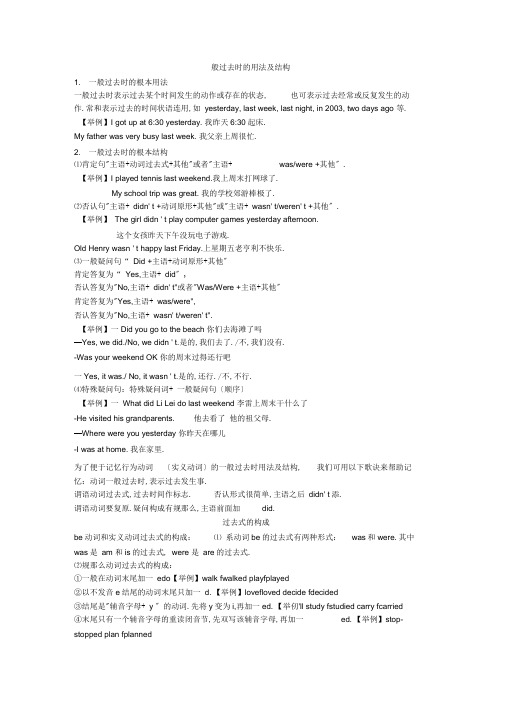
般过去时的用法及结构1. 一般过去时的根本用法一般过去时表示过去某个时间发生的动作或存在的状态, 也可表示过去经常或反复发生的动作.常和表示过去的时间状语连用,如yesterday, last week, last night, in 2003, two days ago 等.【举例】I got up at 6:30 yesterday. 我昨天6:30起床.My father was very busy last week. 我父亲上周很忙.2. 一般过去时的根本结构⑴肯定句"主语+动词过去式+其他"或者"主语+ was/were +其他〞.【举例】I played tennis last weekend.我上周末打网球了.My school trip was great. 我的学校郊游棒极了.⑵否认句"主语+ didn' t +动词原形+其他"或"主语+ wasn' t/weren' t +其他〞.【举例】The girl didn ' t play computer games yesterday afternoon.这个女孩昨天下午没玩电子游戏.Old Henry wasn ' t happy last Friday.上星期五老亨利不快乐.⑶一般疑问句“ Did +主语+动词原形+其他〞肯定答复为“ Yes,主语+ did〞,否认答复为"No,主语+ didn' t"或者"Was/Were +主语+其他〞肯定答复为"Yes,主语+ was/were",否认答复为"No,主语+ wasn' t/weren' t".【举例】一Did you go to the beach 你们去海滩了吗—Yes, we did./No, we didn ' t.是的,我们去了./不,我们没有.-Was your weekend OK 你的周末过得还行吧一Yes, it was./ No, it wasn ' t.是的,还行./不,不行.⑷特殊疑问句:特殊疑问词+ 一般疑问句〔顺序〕【举例】一What did Li Lei do last weekend 李雷上周末干什么了-He visited his grandparents. 他去看了他的祖父母.—Where were you yesterday 你昨天在哪儿-I was at home. 我在家里.为了便于记忆行为动词〔实义动词〕的一般过去时用法及结构, 我们可用以下歌诀来帮助记忆:动词一般过去时,表示过去发生事.谓语动词过去式,过去时间作标志. 否认形式很简单,主语之后didn' t添.谓语动词要复原.疑问构成有规那么,主语前面加did.过去式的构成be动词和实义动词过去式的构成:⑴ 系动词be的过去式有两种形式:was和were.其中was是am 和is的过去式, were 是are的过去式.⑵规那么动词过去式的构成:①一般在动词末尾加一edo【举例】walk fwalked playfplayed②以不发音e结尾的动词末尾只加一d.【举例】lovefloved decide fdecided③结尾是"辅音字母+ y 〞的动词.先将y变为i,再加一ed.【举仞'll study fstudied carry fcarried④末尾只有一个辅音字母的重读闭音节,先双写该辅音字母,再加一ed.【举例】stop-stopped plan fplanned规那么动词的过去式构成方法可用以下口诀来记忆:过去式构成有规律,一般词尾加一ed如果词尾有个e 〔不发音的〕,只需直接加上一d. “辅音字母+ y 〞在词尾,变y为i加一ed.“一辅重闭〞作尾巴,双写之后加一ed.随堂练习:一.写出以下动词的过去式./is _________ ___________ _____________ ____________'t 6. aren' t二.用适当的词完成以下对话.1.— How was your weekend — It great.一What _ you_ last weekend — I _ some homework.to the beach.2. 一What last weekend She3. —What —___ they do last weekend —They ___ ___ to the movies.三.用括号内所给词的适当形式填空.1. We(enjoy) ourselves at the party last night.(study) for the English test last Sunday.you(go) to the Great Wall last year4. What day(be) it yesterdayold man(be)ill and went to see a doctor.(have) a party last night.(visit) the museum and went home.8.— How(be) the students — They were very friendly.often(have) supper at home. Today he(have) supper at school.had great fun(play) in the water.made me(feel) very happy.12.-he(have) lunch at nine — No, he didn ' t.(buy) a guitar yesterday.四.句型转换.1. He came here last month.(改为否认句)He here last month.1.1. hey played football this morning.(改为一般疑问句并作简略答复)一they football this morning —Yes, they./ No, they.3 .They went to Beijing last year.(就划线局部提问)they last year.4 .Tom watched TV last night.(改为一般疑问句)Tom TV last night5 .Mary does homework every day.(用last night 改写句子)Mary.般现在时的用法与结构1、一般现在时的定义及构成一般现在时表示现在经常反复发生的动作、存在的状态或习惯性的动作.〔1〕 be〔am,is,are〕动词:〔作谓语动词时〕肯定句:主语+be动词〔am,is,are〕+其它.如:①I am a student.〔主语+be动词+名词〕②They are hungry.〔主语+be动词+形容词〕③He is out.〔主语+be动词+副词〕④That pen is mine.〔主语+be动词+ 代词〕⑤I am fifteen.〔主语+be动词+数词〕⑥The bike is under the tree.〔主语+be动词+H司短语〕运用am,is,are写三个句子否认句:主语+ be〔am,is,are〕 + not +其它.如:He is not a worker.他不是工人. 运用am,is,are 写三个句子一般疑问句:Be〔am,is,are〕 +主语+其它.如:-Are you a student -Yes. I am. / No, I'm not.运用am,is,are 写三个句子特殊疑问句:疑问词+一般疑问句.如:Where is my bike 运用am,is,are 写三个句子特殊疑问句:疑问词〔what, where, who, when, which, whose, how, how many, how much, what shape,what colour,〕,找句子中有没有be动词〔is, am或者are〕或情态动词或者助动词〔特殊疑问句:疑问词+be动词〔is, am或者are〕或情态动词或者助动词+其他〕〔2〕行为动词:主语+ 行为动词+ 〔其它〕.〔作谓语动词时〕1〕主语不是第三人称单数时,肯定句为:主语+动词原形+其它否认式为:主语+don't+动词原形+其它疑问句为:Do+主语+动词原形+其它. ① We speak Chinese.②Do you speak Chinese ---Yes, I do. / No, I don't.③They don't speak Chinese.写三个句子2〕当主语是第三人称单数时:〔he,she,it,A/An,单独的人或事物:Lily/book〕肯定句为:主语+动词〔词尾加s或es〕 +其它.否认式为:主语+doesn't+动词原形+其它.疑问句式:Does+主语+动词原形+其它①He speaks English.②He doesn't speaks English.③-Does she go to work by bike Yes, she does. / No, she doesn't.写三个句子特殊疑问句:疑问词+一般疑问句.如:How does your father go to work3〕动词+s的变化规那么〔1〕一般情况下,直接加-s,如:cook-cooks, milk-milks〔2〕以s. x. sh. ch. o 结尾,力口-es, 如: guess-guesses, wash-washes, watch-watches, go-goes 〔3〕以"辅音字母+y"结尾,变y为i,再加-es,如:study-studies〔3〕情态动词〔作谓语动词时〕〔can,could,be able to,may,might,must,have to,need,shall,should, will,would〕时,句子结构为:肯定句:主语+情态动词+动词原形.否认句:主语+情态动词+not+动词原形一般疑问句;情态动词+主语+动词原形+其他特殊疑问句:疑问词+情态动词+主语+动词原形+其他Eg:① He can speak English.② Can I help you What can I do for you在实际应用中,一般现在时常与以下时间状语联用:always, usually, often, sometimes, every week (day, year, month …), once a week, on Sundays 例句:He usually plays football on Sundays.一、写出以下动词的第三人称单数talk forget hope stop perform play saybuy worry fly study like make take__love recite become come drive二、句型转换1. The children have a good time in the park.否认句:_______________________________________________一般疑问句:_____________________________________________对划线局部提问:_________________________________________2. There is about nine hundred people at the concert.否认句:_______________________________________________一般疑问句:_____________________________________________对划线局部提问:_________________________________________3. Ann does her homework yesterday evening.否认句:_______________________________________________一般疑问句:_____________________________________________对划线局部提问:_________________________________________4. I read an English book.否认句:______________________________________________一般疑问句:_____________________________________________肯定/否认答复:________________________________________对划线局部提问:_________________________________________5. My brother is in the park just now.否认句:______________________________________________一般疑问句:_____________________________________________对划线局部提问:_________________________________________一般现在时第三人称单数句型转换练习1. I go to school before 7:00 in the morning.(he ) __________________________________________________________2. I always go shopping with my mum on Sunday.( she ) ________________________________________________________2.1 sometimes play computer games after school on Sunday.( he ) _________________________________________________________4. I always take exercise after class on Monday.( my mother ) ________________________________________________________般过去时详细讲解与练习题一、巧记一般过去时:动词一般过去时,表示过去发生的事;be用was或用were, have,has变had;谓语动词过去式,过去时间作标志;一般动词加-ed,假设是特殊得硬记.否认句很简单,主语之后didn' t添;疑问句也不难,did放在主语前;}不含be动词时如果谓语之前有did,谓语动词需复原;动词假设是was,were,否认就把not添. }含be动词时疑问句也不难,要把was, were放在主语前.二、be的一般过去时:学习动词be的一般过去时,下面有一口诀,它可以帮你们更好地掌握动词be的一般过去时.be的过去时有四巧:一是时间状语巧,表示过去的短语要记牢;二是形式巧,单数was,复数were ;三巧是否认句结构, not紧跟was/were ;四是疑问句式巧,was/were向前跑(提前).【一巧】时间状语(即标志词)巧.一般过去时表示过去发生的动作或存在的状态,恰巧与表示过去的一些时间状语连用.1 . yesterday 或以其构成的短语:yesterday morning(afternoon, evening) 等;2 .由“last+-时间名词〞构成的短语:last night, last year (winter, month, week)等;3 .由“时间段+ago〞构成的短语: a moment ago, a short time ago, an hour ago 等;4 .其它:just now 等5 .由某些表示过去时态的从句等.【二巧】形式巧.它与一般现在时一样,形式多样:当主语是第一人称单数或第三人称单数时,谓语动词用was;主语是第二人称或其他人称复数时,谓语动词用were.例如:I was in the classroom yesterday morning . 昨天早上我在教室里.He was at school last Tuesday. 上周二他在学校.They were over there a moment ago . 刚刚他们在刃B边.【三巧】否认句结构巧.与动词be的一般现在时一样, 它在动词后面加not即可变成否认句,并且was, were与not可以缩写成wasn't, weren't o即:主语 + wasn't/ weren't + 表语 +其他.例如:I was not (= wasn't) here yesterday . 昨天我不在这儿.My parents were not ( = weren't) at home last Sunday . 上周日我父母不在家.【四巧】疑问句式巧.把was, were 提到句首,句末用问号即可变为一般疑问句. 即: Was(Were) +主语+表语+其他这恰巧与动词be 的一般现在时的疑问句式相似.例如: Were you at home the day before yesterday ? 前天你在家吗Was she late this morning?今天早上她迟到了吗更巧的是疑问句的答语也相似,肯定答复用“ Yes,主语+ was/were . 否认答复用“No,主语+ wasn't/weren't .".例如:一Were Wei Hua and Han Mei here just now ?刚刚魏华和韩梅在这儿吗— Yes, they were. (No, they weren't .)是的,她们在.(不,她们不在.)一、单项选择: 从以下各题后所给的四个选项中选择最正确答案填空. (10)( )1. My father ill yesterday . A isn't B. aren't C. wasn't D. weren't ()2. your parents at home last week ?A IsB WasC AreD Were()3. The twins in Dalian last year.They here now .A are; wereB . were; areC was; areD were; was ()4. your father at work the day yesterday (前天)? A. Was; before B. Is; beforeC. Was; afterD. Is; after()5. —Who was on duty last Friday ?A I amB I wasC Yes, I wasD No, I wasn't ()6. I cleaned my classroom.A with three hoursB three hours agoC in three hoursD three hours before ( )7. I came my house two days ago .A back onB back toC to backD back () 8 . He did some reading at home.A What does your father do yesterday eveningB What does your brother do in the schoolC What did your brother do over the weekendD Where did your brother go last Sunday ()9. What did you do I went to the movies.A next morning Bover the weekend C in the weekend D next Monday ()10. The koala sleeps, but gets up. A during the day; at the eveningB at day during nightC in the day during the eveningD during the day ; at night二、请用正确动词形式填空.(10)1. I ______2.__ (have) an exciting party last weekend. _ she _______ (practice) her guitar yesterday No, she ___________ 3. What____ T om _______ (do) on Saturday eveningHe ______ _(watch) TV and _________ (read) an interesting book. 4. They all________ (go) to the mountains yesterday morning.5.She ____ ____ (not visit) her aunt last weekend.She _____ ___ (stay) at home and _______ (do) some cleaning.6. When __ ____ you ________ (write) this song I _________ (write) it last year.7 .My friend, Carol,〔study〕 for the math test and〔practice〕 English last night.8 .Mr. Li〔do〕 the project on Monday morning Yes, he.9 . How〔be〕 Jim's weekend It〔be not〕 bad.10 .〔be〕 your mother a sales assistant last year No. she.三、译以下句子〔20〕1 .我过了一个忙碌但却刺激的周末.I ______________________________________ exciting weekend.2 . Jenny喜欢看书.昨晚她看了一本英语书.Jenny likes. She an English book last night.3 . Emma每天都看电视.可是昨天他没有看.Emma TV every day. But he yesterday.4 .上周六他们做什么了他们做作业和购物了.What they SaturdayThey homework and.5 .今天早上方方得做饭,由于他父亲不在家.This morning Fangfang ________________ because his father yesterday.6 .你还有什么要说的What would you like7 .放学另U忘了向老说声再见. Don, t forget ____________________________ the teacher.8 .为什么你昨晚没有看电视Why you TV last night9 .他在清扫教室的时候,发现地上有块表.When he the classroom, he a watch on the ground.10 .他什么时候出生的1980年.--When he---1980.四、改写句子:〔20〕1、Lucy did her homework at home.〔改否认句〕Lucy her homework at home.2、He found some meat in the fridge 〔冰箱〕.〔变一般疑问句〕 he meat in the fridge3、There was some orange in the cup.〔变一般疑问句〕 there orange in the cup4. Frank read an interesting book about history. 〔一般疑问句〕Frank an interesting book about history5. Why not go out for a walk 〔同义句〕out for a walk6. Thomas spent RMB 10 on this book.〔否认句〕Thomas RMB 10 on this book.7. My family went to the beach last week.〔划线提问〕family last week8. I think she is Lily' s sister.〔否认句.注意否认转移〕9. Sally often does some reading in the morning. 〔否认句〕Sally often some reading in the morning.10. He is a tall, thin boy.〔划线提问〕_ he五、改错题(20)1. How is Jane yesterday2. He go to school by bus last week.3. He often goes home at 6:00 last month.4. I can fly kites seven years ago. _____________________________5. Did you saw him just now. ___________________________________6. Tom wasn' t watch TV last night. _____________________________________7. I didn ' t my homework yesterday. ____________________________________8. He wait for you three hours ago. ___________________________________9. Who find it just now ________________________________________make him cry (哭)just now __________________________________六、完形填空(10)Tom did not like doing his homework , because he liked to do some 1 things after school . And his teacher always 2 a lotof mistakes in his homework .Then one day, his maths teacher 3 at Tom' s homework and saw that he got all hisanswers right . He was very 4 and surprised (惊奇).The next morning before class ,he called Tom 5 his desk and 6 to him , “You got all your homework right thistime . Did your father help you " Sometimes Tom' s father helped him with his homework , 7 this time he didn ' t help Tom because he 8 at home . So Tom answered, " NO,Sir. He Was busy last night, so I 9 to do it 1010. . A. others B. another C . the other D. other11. . A. made B. found C. looked at D. looked12. . A. laughed B. knocked C. looked D. saw13. . A. please B. pleased C. pleasure D. sad14. . A. to B. forC. inD. at15. . A. talked B. asked C. spoke D. said16. . A. and B. but C. so D. or17. . A. isn' t B. won' tbeC. wasn' t D. can' t be18. . A. wanted B . mustn ' t C. liked D. had19. 0. A. itself B . of them C . myself D. himself七.写作(10).日记一那么,字数50---60.记叙一天的活动:1 .早晨起床,吃饭,上学;2 .上午的课程,并就其中一堂课进行描述; 3.午休的活动;4.下午的课程及作业;5.晚上的安排.答案:一、单项选择:1---5 CDBAB 6----10 BBCBD二、 2. Did; practice; didn't ; do; watched; read5.didn't visit; stayed; did write; wrote ; practiced8. Did; do;did ; wasn't 10. Was; wasn't三、 a busy but books; read; didn't watch TV ; do last; did their; went shoppingto cook breakfast; wasn't at home ; to say; say goodbye to ; watch ; found ; born; In四、't do 2. Did; find any 3. Was; any4. Did; read5. Why don't you go 't spend did your; go 8. I don't think she is Lily's sister 't; do. 10. What does; look like五、't didn't7.在didn't 后力口do六、1----5 DBCBA 6——10 DBCDC七、写作〔略〕。
- 1、下载文档前请自行甄别文档内容的完整性,平台不提供额外的编辑、内容补充、找答案等附加服务。
- 2、"仅部分预览"的文档,不可在线预览部分如存在完整性等问题,可反馈申请退款(可完整预览的文档不适用该条件!)。
- 3、如文档侵犯您的权益,请联系客服反馈,我们会尽快为您处理(人工客服工作时间:9:00-18:30)。
一般过去时的用法详解公司内部编号:(GOOD-TMMT-MMUT-UUPTY-UUYY-DTTI-
一般过去时
一.定义
一般过去时用来表示过去某一时间内发生的动作或存在的状态以及过去习惯性、反复性的动作。
谓语动词要用动词的过去式,常和表示过去的时间状语连用,如yesterday昨天、last night昨晚、last week上周、last year去年,等。
二.动词过去式的变化
1. be词的过去式:?am?is?的过去式为was;?are的过去式为were
注:在这种构成中,be动词有人称和数的变化,即要根据主语选用was?/?were。
Be动词分为单数和复数,主语为单数用was, 主语为复数用were
2. 规则动词的过去式
a. 一般情况下,在动词原形后面加-ed。
look→looked play→played start→started
b. 以不发音e结尾的动词,在词尾直接加-d。
live→lived use→used
c. 以“辅音字母+ y”结尾的动词,先将 y 改为i ,再加–ed。
study→studied try→tried fly→flied
d.以重读闭音节(即辅音+元音+辅音)或r音节结尾,末尾只有一个辅音字母的动词,要先双写这个辅音字母后,再加–ed。
stop→stopped plan→planned prefer→preferred
2. 不规则动词的过去式是需要记忆的,详见书上的不规则动词表
三.一般过去时的基本用法
1. 表示过去某个特定时间发生的动作或存在的状态。
eg. He suddenly fell ill last night. (他昨晚突然病倒了)
2. 表示过去的习惯性或经常发生的动作。
eg. She went to the cinema once a month when she was at school. (她上学时每个月去看一场电影)
When I was in the countryside, I often walked by the riverside.
我在乡下时经常在河边散步。
3. 一般过去时表示过去经常或反复发生的动作,常和often经常,always总是,once a week一周一次,等表示频度的时间状语连用。
eg. She went to the cinema once a month when she was at school. (她上学时每个月去看一场电影)
4.叙述过去连续发生的一件件事。
eg. She got up early, fetched water, cleaned the room and then went out for a walk. 她早早起床,提水,打扫房间然后出去散步。
四.一般过去时的判断标志词
yesterday , the day before yesterday , last + 时间 , this morning
时间 + ago , just now , a moment ago , in + 过去的时间
五.一般过去时的句型转换
1. 谓语动词为be动词时
陈述句式:主语 + be(was , were) + 其它.
否定句式:主语 + be(was , were) + not + 其它.
一般疑问句:Be(was , were) + 主语 + 其它?
特殊疑问句:特殊疑问词+be过去式+主语+其他?
eg. 陈述句:He was a teacher ten years ago.
否定句式:He wasn’t a teacher ten years ago.
一般疑问句:Was he a teacher ten years ago-
特殊疑问句:What was he ten years ago
2. 谓语动词为实意动词时
陈述句式:主语 + 动词(过去式)+ 其它
否定句式:主语 + didn’t + 动词(原形)+ 其它【did not = didn’t】
一般疑问句:Did + 主语+ 动词(原形)+ 其它【do , does的过去时均为did】?
特殊疑问句:特殊疑问词+do/does过去式+主语+动词原形+其他?
eg. 陈述句式:He lived in Bengbu last year.
否定句式:He didn’t live in Bengbu last year.
一般疑问句:Did he live in Bengbu last year
特殊疑问句:Where did he live last year
3. 谓语动词为情态动词时
陈述句式:主语 + 情态动词 + 其它.
否定句式:主语 + 情态动词 + not + 其它.
一般疑问句:情态动词 + 主语 + 其它?
特殊疑问句:特殊疑问词+do/does过去式+主语+动词原形+其他?
eg. 陈述句式:He could swim when he was just a little boy.
否定句式:He could’t swim when he was just a little boy.一般疑问句:Could he swim when was just a little boy
特殊疑问句:What could he do when he was just a little boy。
